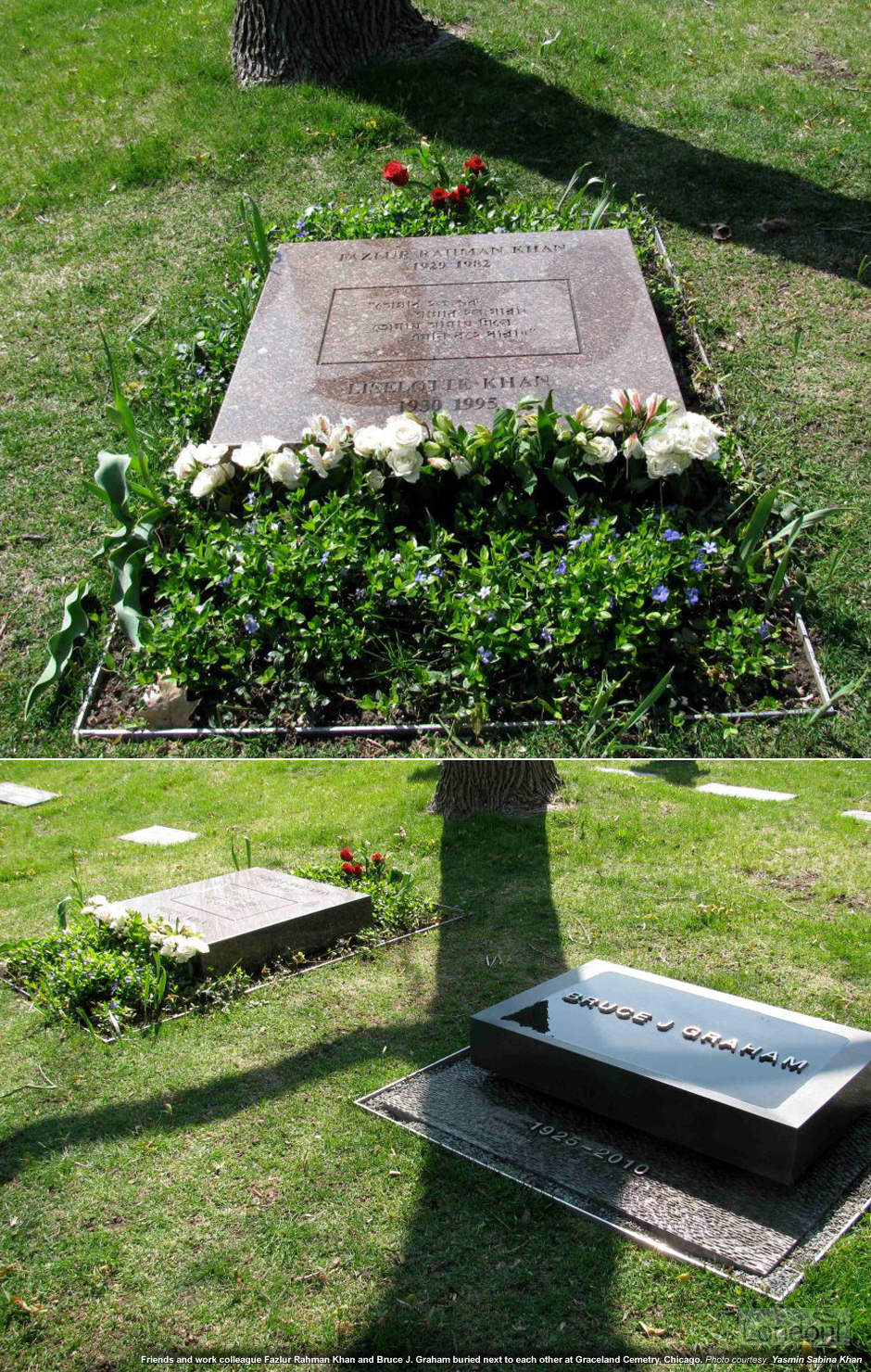
Die from a heart attack in Jeddah, Saudi Arabia
Last updated: 10 October 2017 From the section Fazlur Rahman (F. R.) Khan
On 27 March 1982, a week before his 53rd birthday and a day after Bangladesh's 11th year anniversary, Fazlur Rahman Khan suffered a fatal heart attack during a business trip to the Middle East. He was in Jeddah, Saudi Arabia working on a SOM project when he suffered the attack. SOM arranged for his dead body to be flown to his adopted home of Chicago for burial.
The afternoon of 27 March 1982 suddenly turned into an extremely gloomy one. I and my friend Khalil Khan were accompanying Dr. Khan, when in a fraction of a second we found ourselves in an unexpected situation of an abrupt emergency, which in a matter of a few minutes led us to the hospital. The tense moments of waiting to hear about his welfare ended in a tragic news. We felt completely stunned as we heard the news. Knowing that he was provided with the best help which possibly could be offered in that situation, we had no choice except to believe the news.
It was written so [i.e. fate] and no care could have avoided this mishap. We as human being have no choice other than to surrender against the divine Wisdom. We will be sustained in this hour of trial by Him, who sustained all of us.
Munir Ahmed recalls the tragic last moments of Fazlur Rahman Khan
It was also in Saudi Arabia, by coincidence, that Khan died of a heart attack in 1982, while travelling. He was only 52. His daughter does not say so, but it seems a shame that he had spent the last 10 years of his short career running round the world for a corporate firm which had passed its peak, instead of turning consultant and devoting his exceptional creativity and decency to other ends, maybe back in Bangladesh. It was typical of the generous and modest man portrayed in this absorbing book that he never put himself first.
Andrew Saint reviews Yasmin's book "Engineering Architecture: The Vision of Fazlur R. Khan"
At this occasion, I as his Muslim brother, would wish to draw attention to the guidance that our wealth, relations, families, and children are pleasant gifts given to us by Allah the Almighty and the Great. These gifts are loaned to us and we are allowed to be benefited from them for a specified time and after that time is over, they are taken back from us. We are supposed to thank Him when He gives us, and be patient when He puts us on trial by taking them back from us.
Dr. Khan was one of such gifts given to us which made us feel proud of him. And now he has been taken back from us with a promise of reward, mercy and forgiveness. We are also warned to not lose all these rewards by mourning. Moreover mourning or agony can not change what has happened. The best way to remember him will be to pray for him.
May Allah forgive him and bless him with the rewards, and give his family the strength to be patient at this loss.
His Excellency Dr. Abdullah O. Nassief, President of King Abdul Aziz University, Jeddah (6 May 1982)
Burial in Chicago
On 2 April 1982 at 12 noon Fazlur Rahman Khan was buried in Graceland Cemetery in Chicago following Islamic rituals. Tomorrow he would have been only 53 years old. Since Fazlur Khan was an avid Tagore fan, his wife Liselotte chose the first few lines from 'Tomar Holo Shuru' to be inscribed on his gravestone, which was made up mahogany granite with large pegmatite marker.
When he [Fazlur Rahman Khan] passed away, his wife said to me "Zillur, both of you brothers used to frequently sing a song. You were on the piano and he used to sing. I want you to inscribe that [the lyrics] on his headstone. It was Rabindranath's "Tomar holo shuru, amar holo shara; Tumai amai mile, emni boye dhara" [You begin when mine is done; You and me unitedly fulfill the flow]. So I wrote that on his headstone.
Such was the sadness that resulted from his death that arch enemies Bruce Graham and Stanley Tigerman, who had 'long disliked one another rather ferociously and seemed to share not an inch of philosophical turf', buried their rivalry. At the funeral parlor, crowded with famous architects, Bruce Graham suddenly walked up to Stanley Tigerman and embraced him in a kind of macho bear hug. Kind words were exchanged, and the hostility of old slid away.
Tigerman and Graham had both loved the humane and gentle Khan, and it was the shared intensity of grief that changed their own relationship.
When Liselotte sadly passed away on 8 February 1995 and Bruce Graham on 6 March 2010 they were buried next to Fazlur Rahman Khan's grave.
I was in Chicago for my father's birthday, 3rd of April, and was happy to see that the work at the cemetery has turned out nicely. The groundcover around my parents' gravestone was very pretty in bloom (a bit more may still be planted on the sides) and the two stones, my parents' and Bruce Graham's memorial stone, look perfect together - like close partners, each with their own personality.
